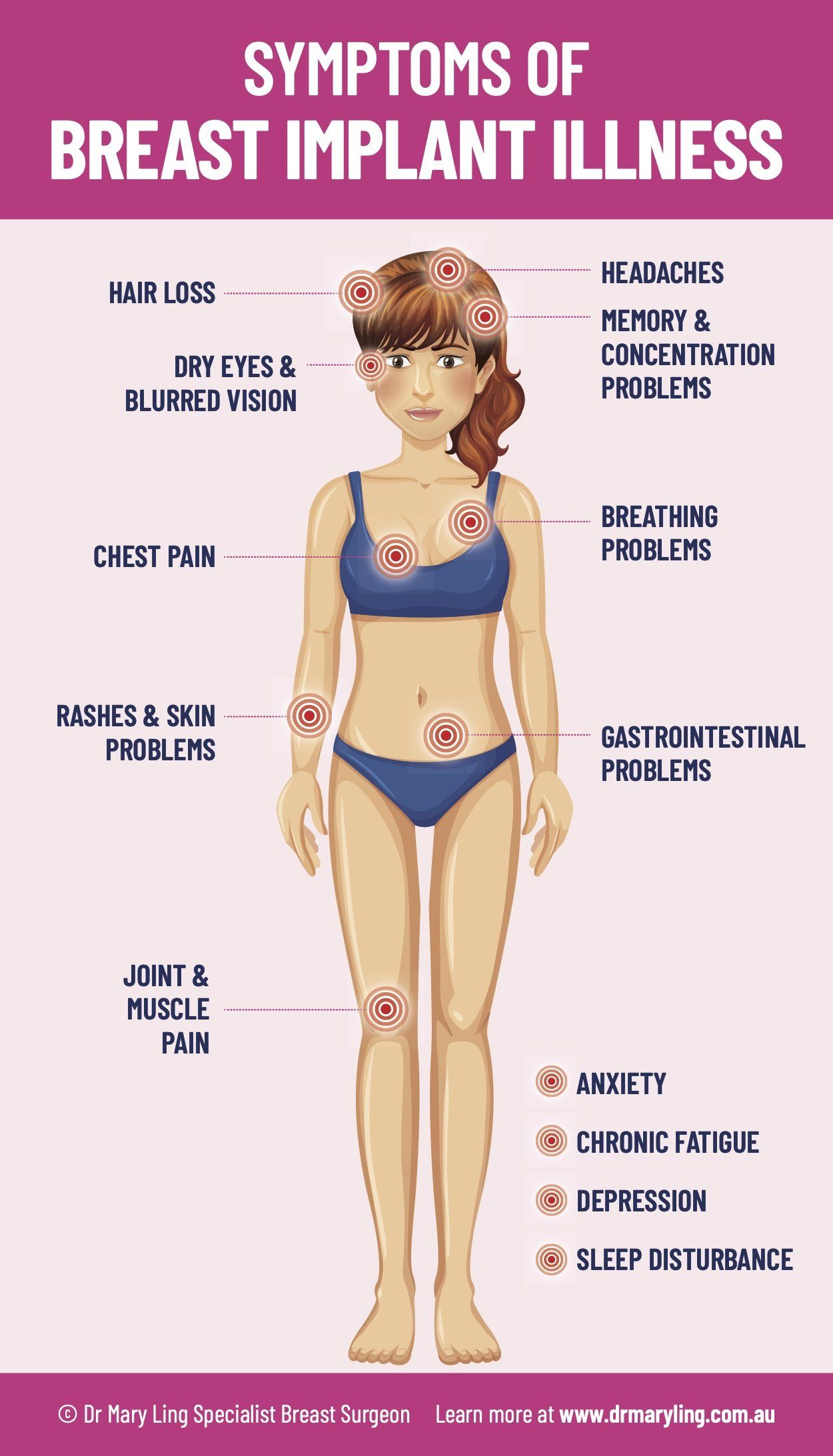BREAST IMPLANT ILLNESS
What is Breast Implant Illness?
Breast Implant Illness (BII), also known as Systemic Symptoms Associated with Breast Implants (SSBI), refers to various symptoms that have been reported by women after augmentation or reconstruction with breast implants.
Concerns about health issues linked to silicone breast implants have been around since the 1960s. In 1992, there was a short-term ban on silicone implants for cosmetic purposes in the United States. BII has been described using different names, including Human Adjuvant Disease, Autoimmune Syndrome Induced by Adjuvants (ASIA), Silicone Implant Incompatibility Syndrome, Shoenfeld's Syndrome, silicone illness and silicone toxicity.
While BII is not universally recognised as an official medical diagnosis, more awareness is emerging. In 2020, the US Food and Drug Administration (FDA) recommended changes to how breast implants are labelled to warn women about potential systemic symptoms such as joint and muscle pain, chronic fatigue and autoimmune diseases.
How common is Breast Implant Illness?
There have been no studies looking at the number of women with breast implants who develop Breast Implant Illness. In recent years, more women have reported symptoms associated with BII, possibly due to increased awareness through social media groups and media coverage of this condition.
What are the symptoms of Breast Implant Illness?
Symptoms of Breast Implant Illness can be non-specific and vary widely among women. It is important to emphasise that these symptoms can be caused by various factors unrelated to breast implants.
The 10 most commonly reported symptoms are: fatigue, joint pain, anxiety, brain fog, autoimmune diseases, hair loss, depression, rash, headache and weight gain or loss.
The symptoms can appear at any time after implant surgery. One review
has reported the average time to be 5.4 years.
Who is at risk of Breast Implant Illness?
Breast Implant Illness is more likely to occur in women who have a personal or family history of autoimmune conditions, allergies and conditions such as irritable bowel syndrome, migraines, chronic fatigue or fibromyalgia.
How is Breast Implant Illness diagnosed?
There is currently no specific test to diagnose Breast Implant Illness. Generally, tests are performed to rule out other potential causes of the symptoms (unrelated to the breast implants).
What is the treatment of Breast Implant Illness?
Surgery to remove the implants (explant surgery) and its surrounding capsule (capsulectomy) can improve symptoms of Breast Implant Illness.
The different techniques of removing the capsule are
- Partial or subtotal capsulectomy: removal of the thickened or calcified part of the capsule (when other sections are too thin to remove without significant damage to the adjacent tissue)
- Total capsulectomy: complete removal of the capsule, but not intact or together with the implant
- Total intact capsulectomy: complete removal of the intact capsule with the implant contained inside
It is recommended that implants are not replaced if the main reason for removal is BII.
What are the outcomes after explant surgery?
There is not much quality research on outcomes after explant surgery. Case series have reported women with partial or complete resolution of symptoms after explant surgery.
Dr Ling has personally treated numerous women who improved from symptoms of breast implant illness after explant surgery, and some women have decided to share their personal stories publicly on Instagram (note: these posts are not solicited or sponsored).
Is Breast Implant Illness the same as Breast Implant Cancer?
No. Breast Implant Illness (BII) is a completely separate condition to Breast Implant-Associated Anaplastic Large Cell Lymphoma (BIA-ALCL). BIA-ALCL is a rare cancer of the immune system that occurs only in women with breast implants. It is not breast cancer, but rather a type of lymphoma that grows in the tissue capsule which the body has formed around the implant.
| Breast Implant Illness | Breast Implant Cancer |
|---|---|
| Unknown incidence | 1 in 1000 to 1 in 10000 women with implants |
| Any type of implants | Textured implants |
| Wide range of systemic symptoms that can affect the entire body | Local symptoms: persistent breast swelling or pain, lump in breast or armpit |
| No specific tests | Ultrasound & MRI breasts & sampling of fluid around implants |
| Breast implant removal with capsulectomy may improve symptoms | Breast implant removal with total intact capsulectomy is usually curative |
For Patients
First Visit Guide Fees & Payments Private Patients NewsletterFor Referrers
Make a Referral Newsletter Useful ResourcesQuick Enquiry
Thank you for contacting us. We will get back to you as soon as possible.
Oops, there was an error sending your message. Please try again later.


